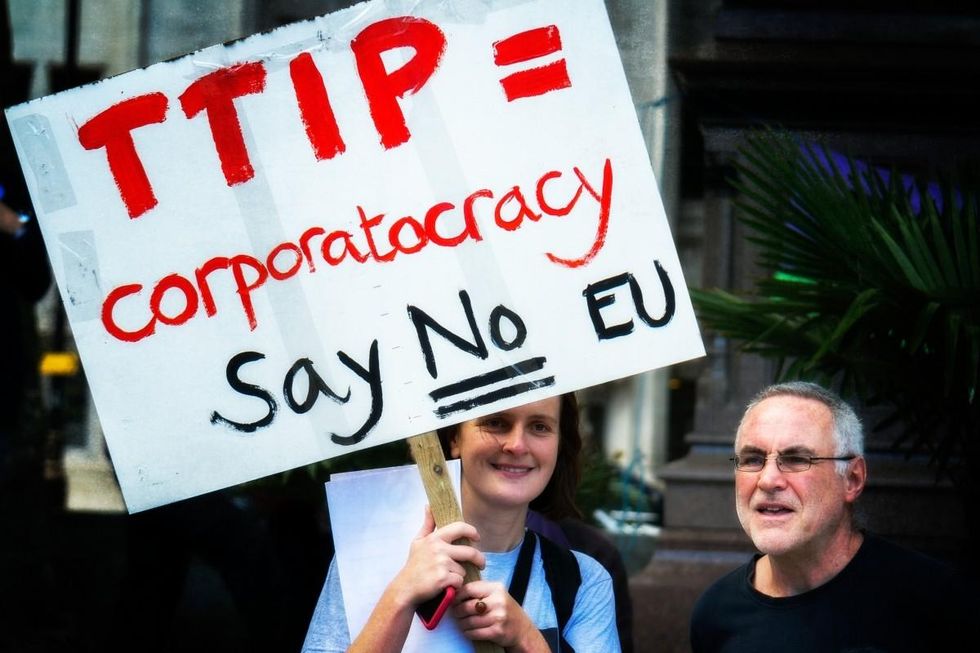The pesticide industry is leveraging its power to push forth a proposal for a pending EU-US trade deal that would put the environment and human health at risk, according to a new report.
The analysis (pdf) by the Washington, DC- and Geneva-based Center for International Environmental Law (CIEL) looks at recommendations (pdf) from pesticide lobby groups CropLife America and the European Crop Protection Association (ECPA) to negotiators for the Trans-Atlantic Trade and Investment Partnership (TTIP) to align regulatory standards by lowering them to US levels rather than increasing them to the stronger safeguards in EU.
The proposal from CropLife America and ECPA, groups that represent the interests of BASF, Bayer, Dow, DuPont, Monsanto, and Syngenta, states: "A harmonized risk assessment framework for pesticide regulation is necessary to ensure the highest level of consumer and environmental protection, while promoting international trade, creating jobs, and enhancing social and economic viability of the EU and the US."
Erica Smith, co-authof the CIEL reports, stated, "Using words like 'harmonization' and 'cooperation' the pesticide industry's proposal hides its true aim: to weaken, slow, or stop efforts to protect people and the planet from exposure to toxic chemicals."
The report, Smith and co-authors David Azoulay and Baskut Tuncak write, "reveals the extent to which the pesticide industry is willing to go to maximize profits."
Specifically, the report states, the proposal would:
- Change EU laws to permit the use of carcinogens and other substances of very high concern as pesticides, posing a health hazard to workers, consumers, and communities;
- Allow the import of food from the US with higher levels of toxic pesticides;
- Weaken, slow or stop efforts to regulate endocrine (hormone) disrupting chemicals;
- Obstruct efforts to save bee populations, risking irrevocable damage to the quality and quantity of our food supply;
- Block access to information that is vital to developing non-toxic alternatives;
- Interfere with the democratic process b y usurping the regulatory authority of US States and EU Member States;
- and Install a "regulatory ceiling" hampering global pesticide regulation
Rather than adhering to the EU's hazard-based approach based on the precautionary principle, CropLife and ECPA's proposal would open the floodgates in Europe to scores of pesticides that are known carcinogens or contain hormone disrupting chemicals and that are banned in the EU but currently allowed in the US, the authors write.
As for how the groups' proposal would thwart the development of non-toxic alternatives, the report states that it would encourage the use of "exclusive use" periods. The report explains:
Exclusive use periods under US law allow for the concealment of regulatory data for a minimum of 10 years after registration. During the exclusive use period, only the provider of data may use or gain access to that information for the purpose of supporting additional studies or registrations, effectively blocking public access to data and information that could illustrate risks and lead to the development and commercialization of safer alternatives to hazardous pesticides.
Also potentially thwarting less harmful alternatives is the industry's proposal for aligned standards on protection of confidential business information, which would include information claimed by companies as "trade secrets."
"Access to information regarding the identity of chemicals is vital for the identification of hazardous properties and for the generation of health and safety information regarding those properties, enabling scientists to develop safer solutions," the report states.
Absent from CropLife America and ECPA's proposal is any mention of regulatory "harmonization" happening as a result of the US adopting more stringent EU standards, the report notes.
The US and EU positions on the pesticide industry's recommendations have not yet been disclosed, CIEL states.
Even without the industry proposal, the TTIP had faced previous criticism by environmental groups based on a leaked text of the deal that included "least trade restrictive" measures that would be a boon to corporations but would threaten fair and safe food for consumers. Further, the Center for Food Safety issued a report on TTIP dangers in May 2014 highlighting that "harmonization" could weaken standards, and put food safety on both sides of the Atlantic at risk.
The European greens have opposed the deal as it stands, as well, based in part on its risk to environmental and food safety. They also warned against giving President Obama fast track authority, also known as Trade Promotion Authority, which would hasten the deal's passage through Congress. That authority has received increased attention as a result of another pending trade deal, the Trans-Pacific Partnership.
The release of the CIEL report coincides with a step towards transparency regarding the TTIP. Following repeated criticism over the deal's secrecy, the EU trade commissioner published the EU's negotiating documents for the trade deal.
The next round of TTIP negotiations are set to take place in Brussels next month.


